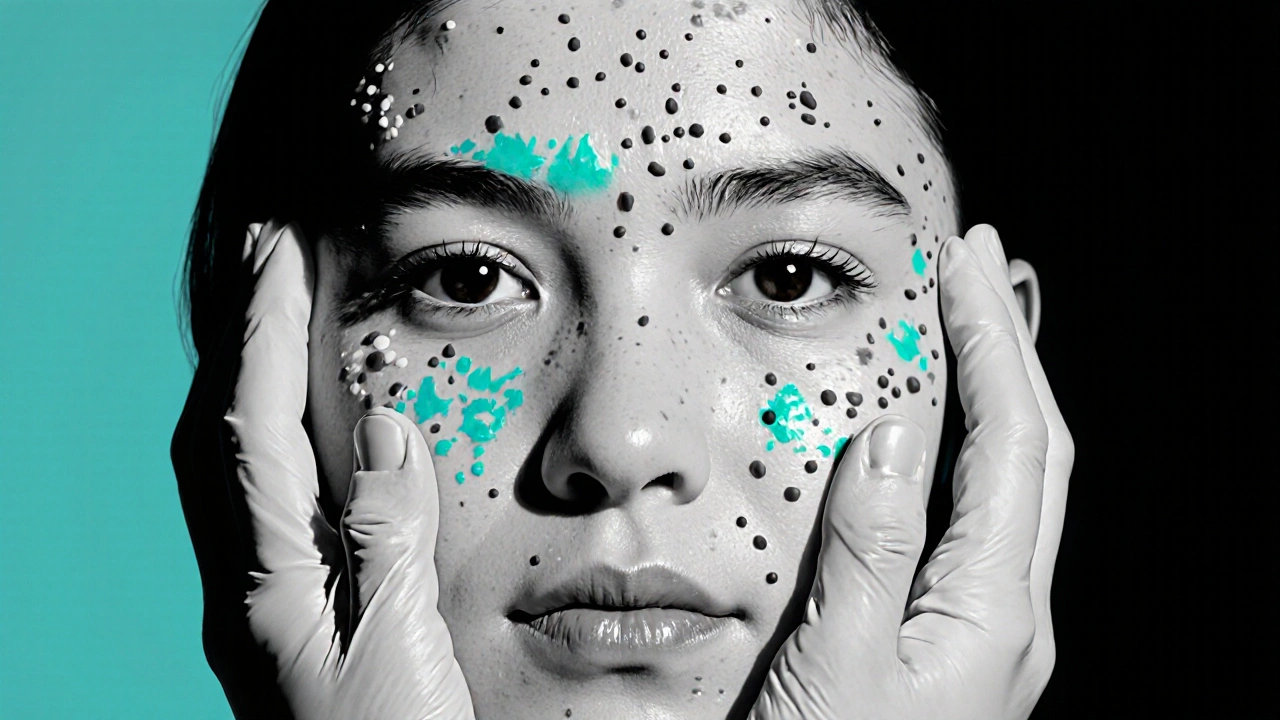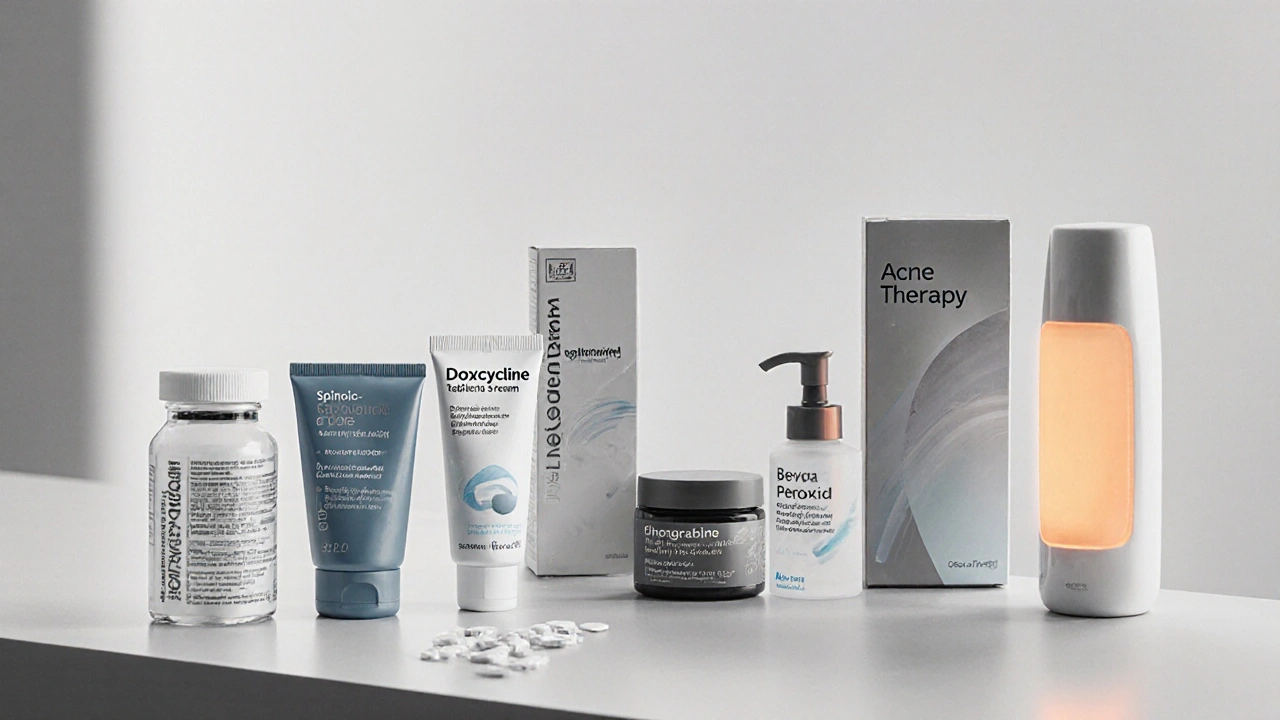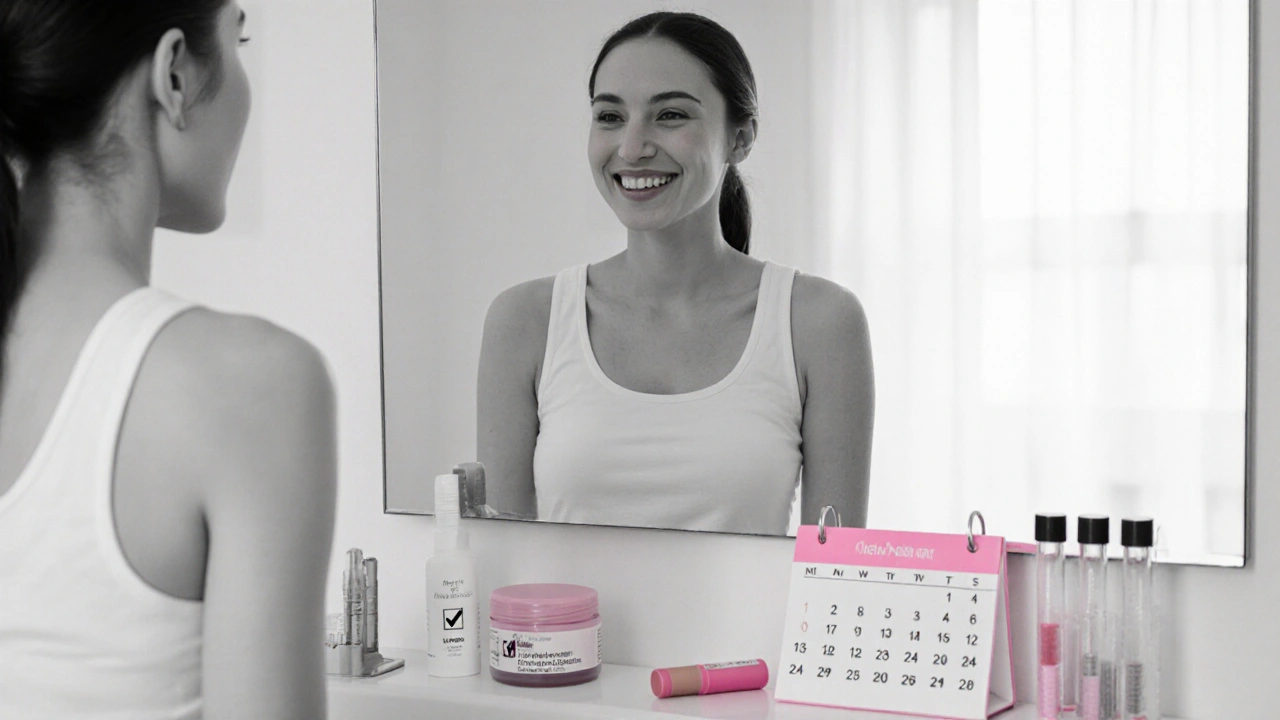
Looking for a clear picture of how Accutane (isotretinoin) measures against other acne options? This guide breaks down the science, the side‑effects, the costs, and the real‑world results so you can decide what’s best for your skin.
What Is Accutane (Isotretinoin)?
Accutane is the brand name for isotretinoin, a synthetic form of vitamin A that targets the root causes of severe acne. It works by shrinking the oil‑producing glands, reducing the amount of sebum that fuels pimples, and normalizing skin cell turnover. Because it attacks acne at its source, doctors often reserve it for nodular or cystic cases that haven’t responded to other treatments.
The typical course lasts four to six months, with a daily dose based on body weight. Most patients see a dramatic drop in lesions within the first two months, and many stay clear for years after finishing the regimen.
Why Look at Alternatives?
Accutane is powerful, but it isn’t for everyone. The drug carries a strict pregnancy‑risk label, can raise blood lipids, and may cause dry skin, joint pain, or mood changes. Insurance coverage varies, and the price can be a hurdle. If you’re pregnant, planning a pregnancy, or have certain liver conditions, you’ll need another approach.
Common Alternatives to Accutane
- Doxycycline - an oral antibiotic that reduces inflammation and bacterial growth.
- Tretinoin - a topical retinoid that speeds up cell turnover.
- Spironolactone - a hormone‑blocking pill often used for hormonal acne in women.
- Azelaic Acid - a topical cream that kills acne‑causing bacteria and reduces redness.
- Benzoyl Peroxide - an over‑the‑counter gel that unclogs pores.
- Light Therapy - in‑office blue or red light sessions that target bacteria and inflammation.
Each option has its own strengths, drawbacks, and best‑fit scenarios. Below we compare them side‑by‑side.
Head‑to‑Head Comparison
| Factor | Accutane (Isotretinoin) | Doxycycline (Oral Antibiotic) | Tretinoin (Topical Retinoid) | Spironolactone (Hormonal) | Azelaic Acid (Topical) | Benzoyl Peroxide (OTC) |
|---|---|---|---|---|---|---|
| Efficacy for severe cystic acne | Very high - often clears >90% of lesions | Moderate - helps inflammation but rarely clears cysts alone | Low‑to‑moderate - best for comedonal acne | Variable - works well for hormonally driven breakouts | Low - primarily for mild to moderate acne | Low - mainly a starter treatment |
| Typical treatment length | 4‑6 months | 3‑6 months (often cyclic) | 2‑3 months to see results | 6‑12 months (continuous) | 2‑3 months | 2‑3 months |
| Pregnancy safety | Contraindicated - high teratogenic risk | Contraindicated - risk of fetal abnormalities | Generally safe (category C) | Contraindicated - not recommended | Safe - category B | Safe - category B |
| Common side‑effects | Dry skin, chelitis, elevated lipids, mood changes | Photosensitivity, gut upset, yeast infection | Dryness, irritation, sun sensitivity | Irregular periods, breast tenderness, dizziness | Minor irritation, tingling | Dryness, peeling |
| Cost (US market, 2025) | $150‑$250 per month (insurance varies) | $30‑$60 per month | $40‑$80 per month | $20‑$40 per month | $25‑$50 per month | $10‑$20 per month |
| Monitoring required | Liver enzymes, lipid panel, monthly pregnancy test | Kidney function, occasional blood count | None (except sunscreen) | Blood potassium, blood pressure | None | None |

Who Should Choose Accutane?
If you have:
- Deep, painful cysts that haven’t improved with topical meds or antibiotics;
- No plans for pregnancy in the next year and can commit to strict birth‑control;
- Good liver health and baseline blood work that looks normal;
- Access to a dermatologist who can monitor labs every month;
Accutane may be the fastest route to clear skin. The payoff can be life‑changing - fewer scars, less self‑consciousness, and a boost in confidence.
When Alternatives Make More Sense
Consider the following situations:
- Pregnancy‑planned or pregnant: Opt for azelaic acid, benzoyl peroxide, or hormonal therapy (if male).
- Mild‑to‑moderate acne: Topical retinoids, benzoyl peroxide, or a short course of doxycycline usually does the trick.
- History of depression or mood swings: Some patients report mood changes on isotretinoin. Talk to your doctor about a non‑retinoid plan.
- Cost concerns: Over‑the‑counter options and generic antibiotics are far cheaper.
Practical Checklist Before Starting Accutane
- Complete a baseline blood panel (liver enzymes, triglycerides, CBC).
- Agree on two forms of birth‑control and take the monthly pregnancy test.
- Discuss any history of mental health issues with your dermatologist.
- Plan for moisturizers, lip balm, and sunscreen - dryness is inevitable.
- Set a reminder for monthly follow‑up labs.

Transitioning Off Accutane
When the course ends, most people stay clear for several months. A gentle maintenance routine-like a low‑strength retinoid or benzoyl peroxide-helps lock in results. If you notice a flare, a brief course of doxycycline can bridge the gap.
Bottom Line
Accutane delivers unmatched results for severe acne, but it carries serious responsibilities. Weigh the severity of your breakouts against pregnancy plans, budget, and tolerance for side‑effects. For many, a step‑up approach-starting with topical or oral antibiotics and only moving to isotretinoin if needed-offers a safe, cost‑effective path.
Frequently Asked Questions
Can I use Accutane if I’m a teen?
Yes, many dermatologists treat severe teenage acne with isotretinoin, but strict birth‑control rules still apply for females, and labs are essential.
How long does it take to see results?
Most patients notice a 50% drop in lesions within 6‑8 weeks, with near‑complete clearance by 4‑5 months.
Is there a generic version of Accutane?
Yes, isotretinoin is available as a generic pill, often at a lower cost, but the monitoring requirements stay the same.
What happens if I become pregnant while on Accutane?
The risk of severe birth defects is high. You must stop the drug immediately and discuss next steps with both your dermatologist and obstetrician.
Are there any long‑term side effects?
Most side effects fade after stopping the medication. A small number of people report lingering dryness or joint pain, but scientific studies haven’t linked isotretinoin to permanent organ damage.


Comments
Sruthi V Nair
Accutane works by cutting the oil glands at the source.
When the sebum production drops the clogged pores shrink.
This cascade explains why severe cystic acne can vanish in weeks.
However the drug does not act in isolation.
Liver enzymes and lipids must be monitored each month.
Pregnancy risk remains the most serious warning.
A disciplined birth‑control regimen is non‑negotiable for anyone who can become pregnant.
The cost, while high, can be offset by generic isotretinoin if insurance allows.
Alternatives like doxycycline or topical retinoids are safer but often slower.
For mild to moderate breakouts they may be enough.
The decision matrix should weigh severity, budget and personal health history.
Many patients report a dramatic confidence boost after clearing.
The psychological benefit can outweigh temporary dryness.
Moisturizers, lip balm and sunscreen become daily essentials.
If side effects become intolerable a dermatologist can adjust the dose.
In some cases a shorter course followed by maintenance retinoids preserves results.
Mustapha Mustapha
Sounds like a solid plan especially if you keep the labs on schedule.
Sticking to the birth‑control rules really does keep the risk low.
Ben Muncie
While Accutane clears skin it also raises ethical questions about prescribing a teratogenic drug without exhaustive counseling.
kevin tarp
Just a heads‑up the term “Accutane” is actually a trademark, so technically the generic name is isotretinoin.
mark Lapardin
From a pharmacodynamic perspective isotretinoin exhibits a high affinity for nuclear retinoic acid receptors which translates into profound sebaceous gland apoptosis.
That mechanistic depth explains why it outperforms doxycycline in terms of lesion clearance speed.
Barry Singleton
Analytically, the cost‑benefit curve for Accutane peaks only when the baseline acne severity score exceeds a threshold.
Below that, the marginal gain doesn’t justify the monitoring overhead.
Javier Garcia
Short courses of doxycycline can bridge flare‑ups post‑Accutane.
christian quituisaca
Think of the skin as a canvas and isotretinoin as the bold brushstroke that clears the chaos, leaving a fresh masterpiece for the artist to fine‑tune with moisturizers and light.
Donnella Creppel
Oh my gosh!!! Accutane is like the *queen* of acne treatments, but honey, don’t forget the crown of side‑effects-dry skin, mood swings, and that oh‑so‑dramatic lipid spike!!! It’s practically a drama queen, isn’t it??
Jarod Wooden
Listen, every time you glorify a drug that reshapes biology you’re participating in a dystopian narrative where convenience trumps humanity-stop celebrating isotretinoin like it’s some miracle and start questioning the moral calculus of systemic interference.